Breast cancer treatment in India is renowned for its affordability and quality, with costs typically ranging from ₹2.5 lakhs to ₹5 lakhs depending on the treatment type. Leading hospitals across the country offer advanced care, including surgery, chemotherapy, and radiation therapy. Early detection significantly improves success rates, often exceeding 80% in early-stage cases. India's combination of expert oncologists, state-of-the-art facilities, and cost-effective care makes it a preferred destination for patients worldwide.
At a Glance: Key Takeaways About Breast Cancer Treatment in India
India offers a range of advanced breast cancer treatments at significantly lower costs compared to many countries. With access to top hospitals and experienced oncologists, patients can expect high success rates, especially for early-stage cases.
- Choose India for affordable, high-quality cancer care.
- Choose early treatment for better outcomes and fewer complications.
- Consider advanced therapies for late-stage or complex cases.
- Top hospitals provide multidisciplinary care and modern facilities.
- Success rates depend on cancer stage and timely intervention.
Costs & Factors: Typical Ranges for Breast Cancer Treatment
What Influences the Cost of Treatment?
Several factors affect the cost of breast cancer treatment in India, including the stage of cancer, type of treatment (surgery, chemotherapy, radiation, or targeted therapy), and hospital location. Advanced therapies like immunotherapy or targeted drugs may increase costs. Additionally, the choice of hospital—private or government—can significantly impact expenses.
Average Costs Across India
The cost of breast cancer treatment in India typically ranges from ₹1,80,000–₹3,60,000 (≈ $2,150–$4,350 USD) for early-stage cases. Advanced treatments or late-stage interventions may cost ₹5,00,000–₹10,00,000 (≈ $6,000–$12,050 USD). These costs are significantly lower than in Western countries, making India a preferred destination for medical tourism.
Hidden or Additional Expenses to Consider
Patients should account for additional costs such as diagnostic tests, follow-up consultations, medications, and post-treatment rehabilitation. Travel and accommodation expenses for outstation or international patients may also add to the overall cost. It’s advisable to discuss all potential expenses with the hospital beforehand.
- Diagnostic tests: ₹10,000–₹50,000
- Post-treatment care: ₹20,000–₹1,00,000
- Travel and lodging: Variable based on location
Explore a detailed breakdown of breast cancer treatment cost in India by visiting our in-depth guide breast cancer treatment cost in India.
How It Works: Steps & Workflow of Breast Cancer Treatment
Initial Diagnosis and Staging
The process begins with diagnostic tests such as mammograms, biopsies, and imaging scans to confirm the presence of cancer and determine its stage. Accurate staging is crucial for tailoring the treatment plan to the patient’s specific needs.
Treatment Planning and Options
Based on the diagnosis, a multidisciplinary team develops a personalized treatment plan. Options may include surgery (lumpectomy or mastectomy), chemotherapy, radiation therapy, or advanced treatments like targeted therapy. The choice depends on the cancer stage and patient health.
Follow-Up and Monitoring
After completing treatment, regular follow-ups are essential to monitor recovery and detect any recurrence. These visits may include physical exams, imaging tests, and blood work. Long-term monitoring ensures better outcomes and quality of life.
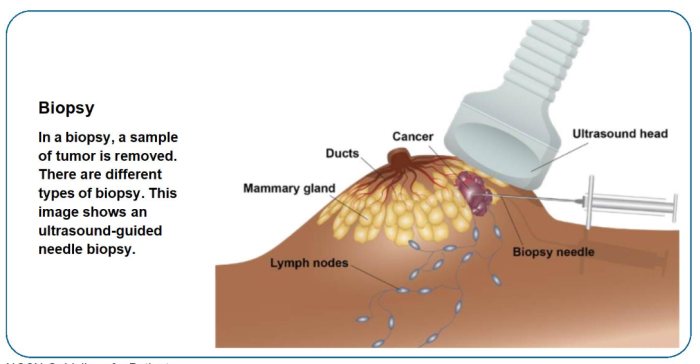
Benefits & Risks: What to Expect from Breast Cancer Treatment
Potential Benefits of Early Treatment
Early treatment of breast cancer significantly improves survival rates and reduces the risk of complications. Patients treated in the early stages often experience better outcomes, shorter recovery times, and a higher likelihood of preserving breast tissue.
Risks and Side Effects of Common Treatments
While effective, treatments like chemotherapy and radiation may cause side effects such as fatigue, nausea, and hair loss. Surgery carries risks like infection or scarring. Advanced therapies may have fewer side effects but can still pose risks like allergic reactions or organ damage in rare cases.
- Common side effects: Fatigue, nausea, and hair loss
- Surgical risks: Infection, scarring, or lymphedema
- Advanced therapies: Rare allergic or organ-related issues
Who It’s For: Eligibility & When to Choose Breast Cancer Treatment
Who Should Consider Treatment in India?
India is a preferred destination for breast cancer treatment due to its combination of advanced medical infrastructure and cost-effectiveness. Patients from countries with limited access to specialized oncology care or those facing long waiting times often choose India. Additionally, individuals seeking personalized treatment plans and access to cutting-edge therapies like targeted therapy or immunotherapy may benefit from India’s expertise.
Eligibility Criteria for Different Treatment Types
Eligibility for breast cancer treatments depends on factors like the cancer stage, hormone receptor status, and overall health. For instance, early-stage patients may qualify for surgery or radiation, while advanced cases might require chemotherapy or targeted therapies. Hormone therapy is suitable for hormone receptor-positive cancers, and immunotherapy is often reserved for specific aggressive subtypes. A multidisciplinary team evaluates these criteria to recommend the best approach.
Alternatives & When They Fit Better
Non-surgical alternatives like hormone therapy, targeted therapy, or immunotherapy may be suitable for patients who cannot undergo surgery due to health constraints or advanced cancer stages. These options can help control tumor growth and improve quality of life. Radiation therapy is another alternative, often used for localized tumors or post-surgery to prevent recurrence. While these treatments are less invasive, they may require longer durations and have specific side effects.

- Choose surgery for localized tumors.
- Opt for hormone therapy if cancer is hormone receptor-positive.
- Consider immunotherapy for aggressive or advanced cases.
- Radiation therapy is ideal for post-surgical recurrence prevention.
- Targeted therapy suits specific genetic mutations.
Timeline & Aftercare: First 4–12 Weeks of Recovery
The recovery timeline after breast cancer treatment varies by procedure. For surgery, initial healing typically takes 2–4 weeks, with full recovery in 6–8 weeks. Chemotherapy or radiation may extend recovery due to fatigue and other side effects. Patients should follow a balanced diet, stay hydrated, and avoid strenuous activities during this period.
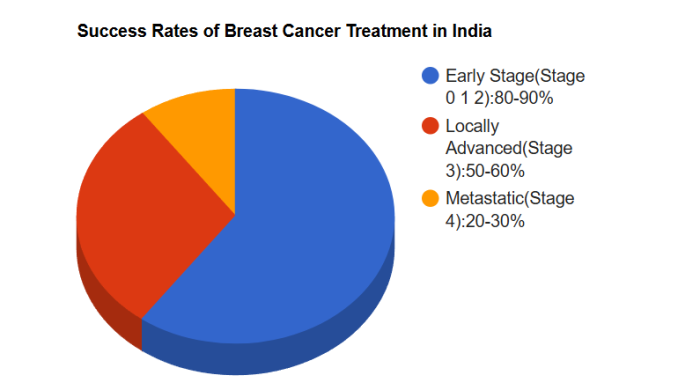
Aftercare includes regular follow-ups to monitor progress and manage side effects. Emotional support through counseling or support groups can also aid recovery. Adhering to prescribed medications and reporting any unusual symptoms promptly is crucial for long-term health.
- Attend follow-ups every 2–4 weeks initially.
- Focus on light physical activities like walking.
- Maintain a high-protein, nutrient-rich diet.
- Seek emotional support if needed.
- Report persistent pain or unusual symptoms.
How to Choose the Right Provider for Breast Cancer Treatment
Choosing the right provider involves evaluating the hospital’s oncology expertise, accreditation, and access to advanced treatments. Look for NABH-accredited centers with multidisciplinary teams and a proven track record in breast cancer care. Additionally, consider hospitals offering personalized treatment plans and support services like counseling.
Researching patient reviews and consulting with specialists can also guide your decision. Some hospitals in India specialize in cutting-edge therapies like immunotherapy and targeted treatments, making them ideal for complex cases. Know more about Surgery.
- Check NABH or JCI accreditation.
- Ensure access to advanced therapies.
- Review patient testimonials and success rates.
- Consult specialists for tailored advice.
- Evaluate post-treatment support services.
Latest Updates & What’s Changing in Breast Cancer Treatment
Recent advancements in breast cancer treatment have introduced more personalized and effective therapies. Techniques like targeted therapy and immunotherapy are now widely used, offering better outcomes for advanced cases. Additionally, minimally invasive surgeries and robotic-assisted procedures are reducing recovery times and improving precision.
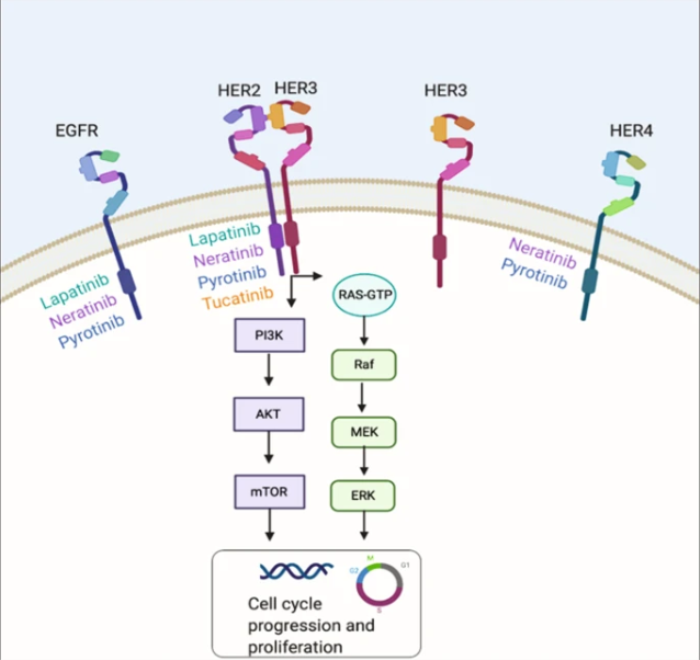
India has also seen an increase in clinical trials, providing access to cutting-edge treatments. The integration of AI in diagnostics is enhancing early detection rates, which is crucial for improving survival rates. These innovations are making treatment more accessible and effective for patients across the country.
- Targeted therapies for specific cancer types
- AI-driven early detection tools
- Robotic-assisted surgeries for precision
- Expanded access to clinical trials
- Improved recovery protocols
Key Differences: Side-by-Side Comparison
Who Is a Good Fit for Each Option?
Early-stage breast cancer patients often benefit from surgery combined with radiation, while advanced-stage cases may require systemic treatments like chemotherapy or immunotherapy. Hormone therapy is suitable for hormone receptor-positive cancers, whereas targeted therapy is ideal for HER2-positive cases. Each option is tailored based on the cancer’s stage and molecular profile.
Performance & Outcomes of Various Treatments
Surgical treatments for early-stage breast cancer have a high success rate, often exceeding 90% when combined with radiation. Chemotherapy and immunotherapy are effective for advanced stages, improving survival rates significantly. Targeted therapies and hormone treatments offer excellent outcomes for specific cancer subtypes, reducing recurrence risks.
Cost & Ongoing Needs for Each Approach
The cost of breast cancer treatment in India varies widely. Surgery typically costs ₹1,80,000–₹3,60,000 (≈ $2,150–$4,350 USD), while chemotherapy can range from ₹1,00,000 to ₹2,50,000 per cycle. Targeted therapies and immunotherapy are more expensive but may reduce long-term recurrence risks. Patients should also consider follow-up care and medication costs.
| Dimension |
Early-Stage Options |
Advanced-Stage Options |
| Candidacy |
Localized tumors |
Metastatic or aggressive cancers |
| Durability/Effectiveness |
High with surgery & radiation |
Improved with systemic therapies |
| Medications |
Minimal post-surgery |
Ongoing for targeted/immunotherapy |
| Recovery Time |
4–6 weeks |
Varies by treatment |
| Risks/Re-operation |
Low with early intervention |
Higher with advanced cases |
| Cost |
₹1,80,000–₹3,60,000 |
₹2,50,000–₹10,00,000+ |
Top Hospitals for Breast Cancer Treatment in India
India is home to several renowned hospitals offering comprehensive breast cancer care. Institutions like Tata Memorial Hospital (Mumbai), AIIMS (Delhi), and Apollo Hospitals (Chennai) are equipped with advanced diagnostic and treatment facilities. These centers are staffed by experienced oncologists and surgeons, ensuring high-quality care.
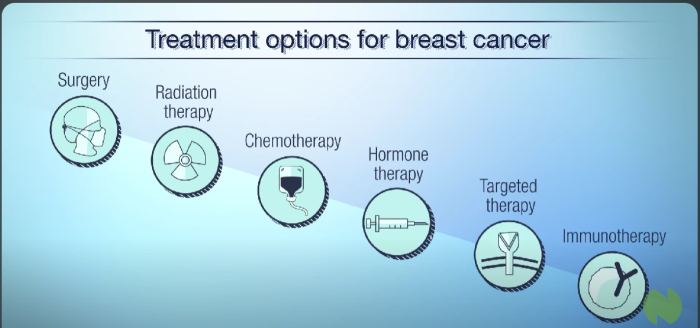
Many hospitals also offer multidisciplinary care, integrating surgery, chemotherapy, and radiation under one roof. NABH accreditation ensures adherence to international standards, making these hospitals a preferred choice for both domestic and international patients.
- Tata Memorial Hospital, Mumbai
- AIIMS, Delhi
- Apollo Hospitals, Chennai
- Fortis Memorial Research Institute, Gurgaon
- Manipal Hospitals, Bangalore
Success Rates & Outcomes in India
Breast cancer treatment in India has shown promising success rates, particularly for early-stage cases, where survival rates exceed 90%. Advanced-stage treatments, including targeted and immunotherapies, have significantly improved outcomes, with many patients achieving long-term remission.

Factors contributing to these outcomes include early detection, advanced technology, and skilled medical professionals. India’s focus on affordable yet high-quality care has made it a global hub for breast cancer treatment, attracting patients worldwide.
- Early-stage survival: Over 90%
- Advanced-stage remission: Significant improvements
- Access to cutting-edge therapies
- Affordable treatment options
- Skilled oncologists and surgeons
Common Misconceptions and Facts About Breast Cancer Treatment
Many believe that breast cancer is always hereditary, but only about 5–10% of cases are linked to genetic mutations. Another misconception is that a lump in the breast always means cancer; however, most lumps are benign. Additionally, some assume that only women are affected, but men can also develop breast cancer, albeit rarely.
- Not all breast lumps are cancerous.
- Breast cancer is not always hereditary.
- Men can also develop breast cancer.
- Early-stage breast cancer can often be treated successfully.
Emerging Technologies and Innovations in Treatment
Advancements in breast cancer treatment include targeted therapies that focus on specific cancer cells, minimizing damage to healthy tissue. Immunotherapy is another breakthrough, helping the immune system recognize and attack cancer cells. Additionally, precision medicine uses genetic profiling to customize treatments for individual patients.

Emerging technologies like AI-driven diagnostics and minimally invasive surgical techniques are also improving outcomes. These innovations reduce recovery time and enhance the accuracy of treatment planning, offering hope for better survival rates.
- Targeted therapies for specific cancer cells.
- Immunotherapy to boost the immune system.
- Precision medicine for personalized treatment.
- AI-driven diagnostics for early detection.
Psychological Support and Counseling for Patients
Breast cancer patients often experience emotional challenges, including anxiety, depression, and fear of recurrence. Psychological support, such as counseling and support groups, can help patients manage these feelings and improve their quality of life. Family involvement in therapy sessions can also strengthen emotional resilience.
Therapies like cognitive-behavioral therapy (CBT) and mindfulness-based stress reduction (MBSR) are effective in reducing stress and promoting mental well-being. Access to professional counseling ensures that patients feel supported throughout their treatment journey.
- Counseling helps manage anxiety and depression.
- Support groups provide shared experiences.
- Mindfulness techniques reduce stress levels.
- Family involvement strengthens emotional support.
Importance of Early Detection and Screening
Early detection of breast cancer significantly improves treatment outcomes and survival rates. Regular screening, including mammograms and clinical breast exams, can identify cancer at an early stage when it is most treatable. Women over 40 are typically advised to undergo annual screenings.
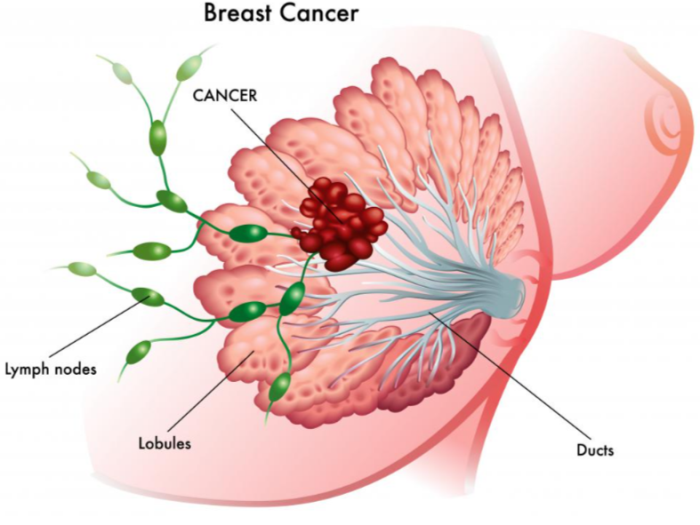
Self-breast exams are another tool for early detection, allowing individuals to notice changes and seek medical advice promptly. Public awareness campaigns and accessible screening programs are crucial in reducing late-stage diagnoses.
- Annual mammograms for women over 40.
- Self-breast exams for early signs.
- Clinical exams by healthcare professionals.
- Awareness campaigns to promote screening.
Frequently Asked Questions About Breast Cancer Treatment in India: Cost, Top Hospitals & Success Rate
What is the average cost of breast cancer treatment in India?
The average cost of breast cancer treatment in India ranges from ₹2,50,000 to ₹6,00,000, depending on the type of treatment and hospital. Factors such as the stage of cancer, type of surgery, chemotherapy, and radiation therapy can influence the overall cost. India offers high-quality treatment at a fraction of the cost compared to many other countries.
Which are the top hospitals for breast cancer treatment in India?
India has several top hospitals for breast cancer treatment, including specialized cancer centers and multi-specialty hospitals. These facilities are equipped with advanced technology and experienced oncologists. Popular cities for treatment include Mumbai, Delhi, Chennai, and Bengaluru, known for their world-class medical infrastructure.
What factors influence the success rate of treatment?
The success rate of breast cancer treatment depends on factors like the stage of cancer at diagnosis, the patient’s overall health, and the type of treatment used. Early detection significantly improves outcomes. Access to skilled oncologists and advanced therapies also plays a crucial role in achieving successful results.
How long does recovery typically take?
Recovery time varies based on the type of treatment and individual health. Surgery may require a few weeks of healing, while chemotherapy or radiation can extend recovery to several months. Patients are advised to follow their doctor’s guidance for post-treatment care to ensure a smooth recovery.
Are there alternative treatments available in India?
Yes, alternative treatments like Ayurveda, yoga, and naturopathy are available in India, often used as complementary therapies. These approaches focus on improving overall well-being and managing side effects. However, they should not replace standard medical treatments and must be discussed with a doctor.
What are the common side effects of breast cancer treatments?
Common side effects include fatigue, nausea, hair loss, and skin changes, depending on the treatment type. Chemotherapy and radiation may also cause weakened immunity. Most side effects are temporary and manageable with proper medical care and lifestyle adjustments.
Is breast cancer treatment in India affordable for international patients?
Yes, breast cancer treatment in India is affordable for international patients due to lower costs and high-quality care. Many hospitals offer packages that include treatment, accommodation, and support services, making it a cost-effective option compared to Western countries.
What support services are available for patients undergoing treatment?
Support services in India include counseling, nutritional guidance, physiotherapy, and support groups. Many hospitals provide holistic care to address emotional and physical needs during treatment. These services help patients cope better and improve their quality of life.
Know more about Surgery
Surgery is a primary treatment option for breast cancer, often used to remove tumors or affected tissues. It can be combined with other therapies for better outcomes. Learn about the best surgical options available in India for breast cancer treatment here.
Know more about Surgery
Know More About Chemotherapy
Chemotherapy is a widely used treatment for breast cancer, especially in advanced stages. It helps destroy cancer cells and prevent their spread. Discover how chemotherapy is administered and its role in breast cancer care in India.
Know More About Chemotherapy
Targeted Therapy
Targeted therapy focuses on specific molecules involved in cancer growth, offering a personalized approach to breast cancer treatment. It is effective in cases where traditional treatments may not work. Explore top hospitals and costs for targeted therapy in India here.
Targeted Therapy
Immunotherapy
Immunotherapy boosts the body’s immune system to fight breast cancer effectively. It is particularly useful for certain types of breast cancer that do not respond to other treatments. Learn about immunotherapy options and their availability in India here.
Immunotherapy
Chemotherapy for Late-Stage Breast Cancer Treatment
This image highlights the role of chemotherapy in managing late-stage breast cancer. Chemotherapy is crucial in reducing tumor size and controlling cancer spread, especially in advanced stages. It is a key component of breast cancer care in India.

Hormone Therapy for Late-Stage Breast Cancer Treatment
This image represents hormone therapy, a treatment that targets hormone-sensitive breast cancers. It is often used in late-stage cases to slow cancer progression and improve quality of life. Hormone therapy is an important option in India’s breast cancer treatment landscape.

Clinical Trials for Advanced-Stage Breast Cancer Treatment
This image highlights the importance of clinical trials in advancing breast cancer treatment. Clinical trials offer access to innovative therapies for advanced-stage breast cancer patients, providing hope and new possibilities. India is actively involved in such research.

Discover the Best Oncologists and Cancer Hospitals in India
When it comes to cancer treatment, finding the right specialist and hospital can make a significant difference in the outcome. In this blog, we have compiled a list of the top oncologists and cancer hospitals across major cities in India, ensuring that you have access to the best care available.
Top Oncologists in Major Cities
For those seeking expert oncologists, we have identified the best specialists in key cities:
Leading Cancer Hospitals
In addition to finding the right specialist, choosing the right hospital is crucial for comprehensive cancer care. Here are the top hospitals in major cities:
Get more indepth information on Cancer treatments and their costs
Conclusion
Finding the right oncologist and hospital is the first step in your cancer treatment journey. Explore the links above to learn more about the top specialists and hospitals in your area.